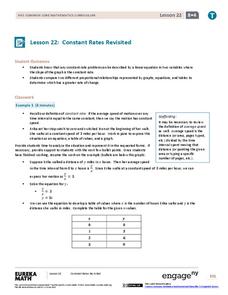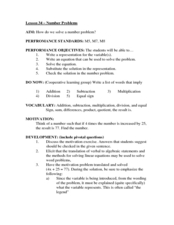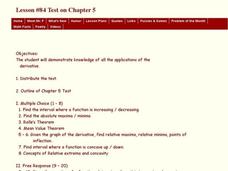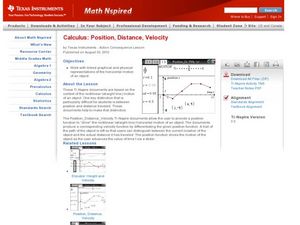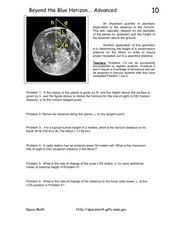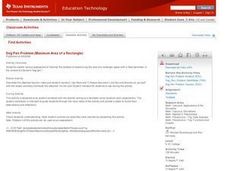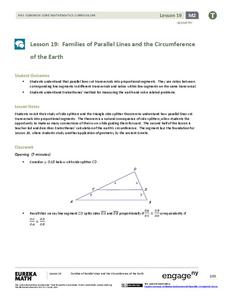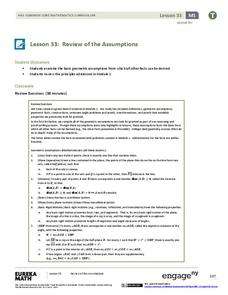EngageNY
Constant Rates Revisited
Find the faster rate. The resource tasks the class to compare proportional relationships represented in different ways. Pupils find the slope of the proportional relationships to determine the constant rates. They then analyze the...
EngageNY
Real-World Positive and Negative Numbers and Zero
Class members investigate how positive and negative numbers are useful in the real world. Individuals first read a short passage and identify terms indicating positive and negative numbers. They consider situations involving positive...
Curated OER
Number Problems
Students write equations for problems. In this number lesson, students add, subtract, multiply and divide numbers to solve for a variable. They rewrite word problems using algebraic symbols.
College Board
2011 AP® Calculus AB Free-Response Questions
So this is the real test? The resource provides the free-response questions from the 2011 AP Calculus AB exam. The six questions are split into two sections, calculator and non-calculator items. Several resources give teachers...
Curated OER
Math 155 Worksheet 6
In this college level calculus worksheet, students determine the derivatives of the indicated functions and solve application problems. The two page worksheet contains seven problems. Answers are not included.
Curated OER
Exploring the Landscape
Students determine the monotonicity and concavity properties of a function, then apply the First Derivative Test and draw conclusions about the first and second derivatives from these properties.
Curated OER
Lesson #84 Test on Chapter 5
Students review Rolle's Theorem. In this derivatives lesson students review for a chapter test on applications of derivatives. Links to two copies of the test are included with the lesson.
Texas Instruments
Minimums, Maximums and Zeroes
Young mathematicians will identify the minimum, maximum-and zeros of a function in this calculus lesson. They relate the derivative of a function to its zeros and minimum or maximum. They then graph their solutions and explain different...
Curated OER
Position, Distance, Velocity
Learners calculate the position, distance and velocity using functions in this calculus lesson. They investigate horizontal motion through the derivative of functions and use the TI to create a visual of their function.
Curated OER
Beyond the Blue Horizon...Advanced
In this calculating the horizon worksheet, students solve 6 problems using algebra, derivatives and calculus to find the formula for the line-of-sight horizon, the distance along a planet, the horizon distance and the rates of change for...
Curated OER
Related Rates
Twelfth graders rewrite word problems using equations. In this calculus activity, 12th graders solve real world situation using the derivative. They solve problems on rate, and distance.
Curated OER
Volume and Surface Area: Which Is More?
Learners explore the volume and surface area of three dimensional figures. Through the use of video, students discover three dimensional shapes, their uses in real-life applications, and methods used to calculate their volume and surface...
Curated OER
Trigonometric Functions of Acute Right Triangles
Students derive the six trigonometric functions. In this trigonometry instructional activity, students show their understanding of trigonometric functions as they relate the right triangles. They find the missing angles and side use trig...
Curated OER
Exponential Decay
Learners study exponential decay and its application to radiocarbon dating. In this exponential decay lesson, students use candy to model the time it takes for something to decay. Learners also graph the data they collect and...
Curated OER
Equations of Circles
Using Cabri Jr. young scholars construct a circle and determine the equation of the circle they drew by finding the center and the radius. Students use the distance formula to derive the equation of their circle.
Curated OER
Engineering in a Calculus Classroom
Students solve several differential equations. In this calculus lesson, students test their modulus calculation by testing different weights or beam lengths. They share their findings in class.
Curated OER
Solving Problems and Puzzles
Review the 7's times tables how they relate to division, fractions, problems solving, and using a chart. Basic problem solving strategies are encouraged for each set of different problems.
Curated OER
Dog Pen Problem
Teach your class about various approaches to solving the problem of maximizing the area of a rectangle space with a fixed perimeter in the context of a farmer's dog pen. Then, they complete a worksheet independently to summarize the...
EngageNY
Families of Parallel Lines and the Circumference of the Earth
How do you fit a tape measure around the Earth? No need if you know a little geometry! Pupils begin by extending their understanding of the Side Splitter Theorem to a transversal cut by parallel lines. Once they identify the...
EngageNY
End-of-Module Assessment Task - Algebra 1 (Module 3)
Looking for higher-level thinking questions? This assessment provides questions that challenge young mathematicians to think and analyze rather than simply memorize. Topics include piecewise functions, linear modeling, exponential...
EngageNY
The Volume Formula of a Pyramid and Cone
Our teacher told us the formula had one-third, but why? Using manipulatives, classmates try to explain the volume formula for a pyramid. After constructing a cube with six congruent pyramids, pupils use scaling principles from...
EngageNY
Review of the Assumptions (part 1)
What was the property again? Tired of hearing this from your pupils? Use this table to organize properties studied and as a reference tool for individuals. Learners apply each property in the third column of the table to ensure their...
EngageNY
Properties of Parallelograms
Everyone knows that opposite sides of a parallelogram are congruent, but can you prove it? Challenge pupils to use triangle congruence to prove properties of quadrilaterals. Learners complete formal two-column proofs before moving on to...
EngageNY
The Power of Algebra—Finding Primes
Banks are responsible for keeping our financial information safe. Mathematics is what allows them to do just that! Pupils learn the math behind the cryptography that banks rely on. Using polynomial identities, learners reproduce the...
